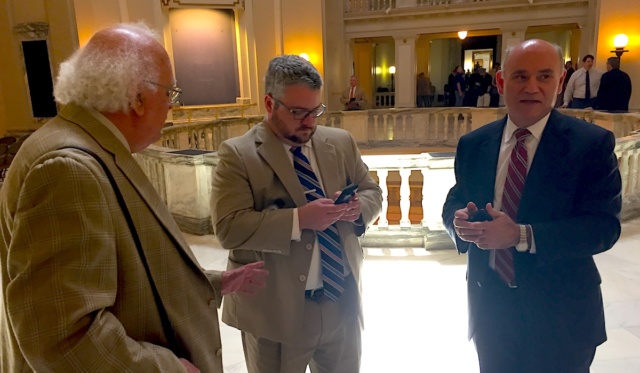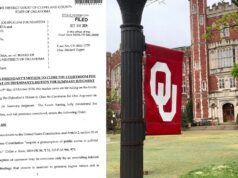

On the second to last scheduled day of the 2017 Oklahoma legislative session, lawmakers sent a bill to Gov. Mary Fallin restoring a major legal tenet that had been dismantled without legal associations, business groups or most legislators noticing.
HB 1570 (embedded below) included language restoring what is known as the American Rule, the idea that each party bears its own costs in civil litigation. Most American jurisdictions carve at small legislative exceptions to that rule.
Sen. Anthony Sykes (R-Moore) had amended HB 1470 in April to include 28 words that eliminated the American Rule, fundamentally altering the legal market in Oklahoma if allowed to take effect Nov. 1:
In any action brought pursuant to the provisions of subsection A of this section, the court shall award court costs and reasonable attorney fees to the prevailing party.
But many lawyers and business entities noticed the change shortly after Gov. Mary Fallin had signed HB 1470, and NonDoc wrote an editorial on the subject to bring it public attention.
One of the Senate’s five lawyers, Sen. David Holt (R-OKC), carried and presented HB 1570 in the Senate.
“It also deletes a part of the same bill from HB 1470 earlier in the session that deals with gross negligence that was arguably in the wrong section and turns out has been almost universally panned by the legal community,” Holt said on the Senate floor.
That part of the bill removed a requirement of proving a high legal standard — “gross negligence” — for suit of employers of people who commit sexual crimes against children.
The bill now heads to Fallin’s desk for final approval.
‘I don’t know anyone who was for this’
John Williams, executive director of the Oklahoma Bar Association, said after Thursday night’s vote on HB 1570 that restoring the American Rule was extremely important.
“The American Rule has between 250 and 300 years of jurisprudence built around it,” Williams said. “In a common law system when you work off of precedence, big swings in the law like that without planning and detail creates great chaos.”
Williams said an OBA member brought it to his attention.
“It was something I kind of took a double take on,” he said. “I thought, ‘I don’t think they intended this. “I was pretty certain that the intent of that bill was to extend the statute of limitations on sexual predators and those who violate the trust and safety of children, not about changing the entire nature of our judicial system.”
In a somewhat rare turn of events, Williams found broad opposition to the change that had been passed removing the American Rule in Oklahoma civil cases. The Oklahoma State Chamber and many other business entities worked with Williams and other legal groups to find a fix.
“Every group that I’ve worked with, whether on the same side or opposite sides of issues, was together on this,” Williams said. “Major utilities, insurance companies, oil companies. I don’t know anyone who was for this (major change).
“I’m appreciative of both houses and people on both sides of the aisle who let this come back for a fix.”
Oklahoma State Chamber president Fred Morgan added the following statement:
https://nondoc.com/wp-content/uploads/2017/05/HB1570-CCR.pdf” height=”450px”]House Bill 1570, by Representative Jonathan Echols and Senator David Holt, will make Oklahoma the first state to modernize our lawsuit discovery rules in a manner similar to what was accomplished by the federal courts. House Bill 1570 also fixes a mistake from previous legislation that created a loser pays mechanism that would increase litigation and costs for job creators. We would like to thank the Legislature for passing a quick fix for the loser pay issue and for supporting these significant reforms to our discovery code.
(Update: This post was updated at 9:25 a.m. Friday, May 26, to include the statement from Fred Morgan.)




















